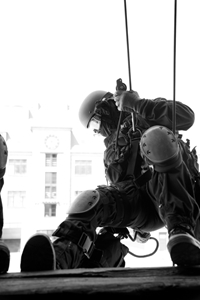The most elite and selective fighting force in the U.S. has been used extensively throughout the wars in Iraq and Afghanistan. Special operations forces have been at the forefront of several major missions in the Middle East since the military's first engagement in the region in 2001, but according to a ranking officer within Special Operations Command, these forces have become overextended and have gone beyond their operational parameters. In order to be the most effective soldiers they can be, special operations forces may have to recommit to their original purpose.
Unseen missions to frontline warriors
Special operations forces have long been deployed on missions of unparalleled importance that never see the light of day in the press. In the wars in Iraq and Afghanistan, however, the same soldiers have been placed on a more regular duty, rooting out insurgents and tracking down the heads of militant bands. Military.com reported that according to Air Force Lt. Gen. Bradley Heithold, vice commander of SOCOM, this is not how special operations forces can best protect the country.
"You've read about the U.S. forces either kill or capture missions and the like against the senior leaders of Al Qaeda – sometimes referred to as a decapitation strategy," Heithold said during a discussion at the National Defense Industry Association. "Is that going to work? No."
Heithold explained how in a meeting with the Joint Chiefs of Staff, he recommended a drawdown of resources allocated to SOCOM. In 2001, Heithold counted 21 extremist groups the U.S. kept tabs on, but despite the increased presence of special operations forces, that number had ballooned to 57. Rather than sending his highly trained soldiers on assassination missions, Heithold would rather they be sent on "indirect missions" like training foreign military groups that take longer to produce results, but are more effective on a larger scale.
Back to basics
SOCOM itself urged that a smaller footprint for its soldiers does not necessarily mean a smaller impact through its missions. The force's website enumerated several key concepts – humans over hardware, strength over size – that prize a small, specialized group of soldiers who are able to carry out high-intensity missions over a large battalion of troops whose training may vary. SOF cannot accomplish its missions alone, however, and depends on the rest of the Armed Forces to accomplish large scale goals. Its this symbiosis that Heithold would like to return to, with SOCOM carrying out niche missions around the globe.

